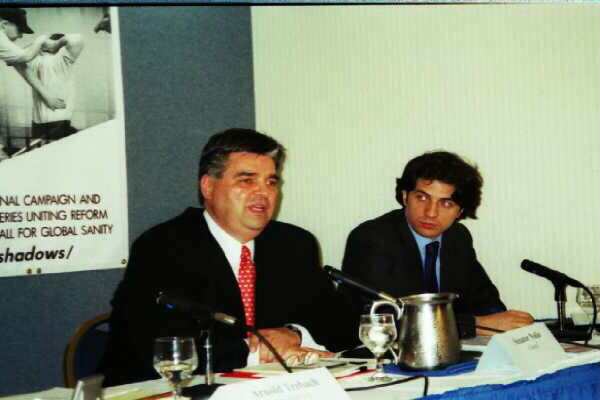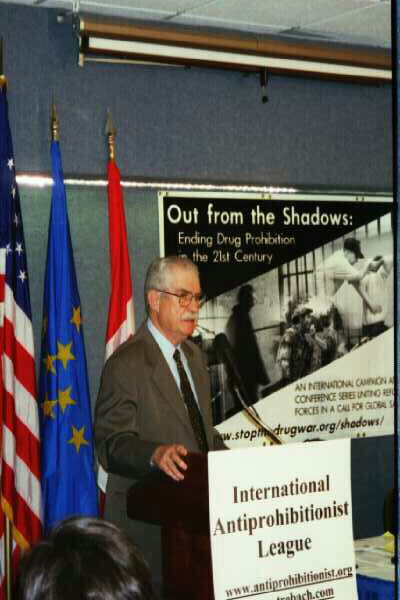Senator
Nolin
Comes
to
Washington
5/2/03
Coming within the context of a movement for drug legalization that has in recent months begun to step out from the shadows -- with a pair of eponymously-named conferences in Brussels and Mérida so far and more to come -- the opposition to more drug war politics as usual evidenced last month at the UN Commission on Narcotic Drugs meeting in Vienna, and Canadian moves to decriminalize or depenalize marijuana, the Wednesday press conference provided an opportunity for anti-prohibitionist voices to take their case to the US press and public.
But harm reduction, while necessary, was not sufficient, Trebach said. "Harm reduction was not enough. Not enough, in many ways. Not enough because it left in place one of the worst inventions of the human mind -- those provisions of the criminal law in every known national code of laws that make criminals of people who possess substances for ingestion into their own bodies. Not enough because by providing humane aspects to a destructive system, it tends to help preserve and perpetuate that system. For these and many other reasons I am now working for full legalization of drugs. Only in this way can the system of prohibition be replaced by a new and more rational legal drug-control system. As I have said many times, this amounts to replacing the law of the jungle with the rule of law," Trebach continued. And despite heartbreakingly slow progress so far, Trebach predicted that the drug war's days are numbered. "Drug prohibition will not be forever. You can take that statement to the bank. In time, drug prohibition will only be a bad memory." But that day has not yet arrived, and US political leaders are determined to see it never does, Trebach said, slamming drug czar John Walters for threats aimed at Canada over its pending marginal drug reforms. "Recently Canada has strayed from rigid prohibition theology and is considering decriminalizing or even legalizing marijuana," Trebach said, and as a result has faced "harsh and irrational" attacks from Walters. "I submit, however, that if the United States can declare that it believes in the freedom of the Iraqi people to choose a whole new government, then it should damn well declare that it believes in the freedom of the people of Canada to choose their own form of drug control." That was an attitude shared by Canada's Sen. Nolin, who told the audience that, "Canadians and presumably Americans deserve national drugs policies that are global, effective and respectful of human rights." It is increasingly clear that neither has that now, he said. "Today, politicians, researchers, lawyers, police officers and medical physicians around the world are no longer afraid to say that the prohibition of so called illegal drugs which led to the war against drugs has been a manifest failure. I firmly believe that for the preservation of life, public health, personal safety, freedom and democracy, this insidious policy, which has not had any beneficial long-term effects, needs to be dismantled." The UN's manifest faith in prohibition is unwarranted, said Nolin. "The many international conventions and national statutes advocating prohibition over the past century -- as well as the attendant introduction of criminal sanctions and the erosion of individual rights as miracle solutions to the problem of illegal drugs) -- have clearly been ineffective in eliminating the supply of and demand for cannabis, cocaine and heroin," Nolin asserted, citing the reams of research his committee had reviewed in examining Canada's drug laws. But perhaps prohibition isn't really -- or merely -- about reducing drug use, the senator suggested. Prohibition protects conservative moral values, said Nolin, "and beyond the declared official rationale for these laws, other factors such as racism, prejudice and myths, the development of the pharmaceuticals industry, and the machinery of an enormous nationwide government bureaucracy to enforce restrictive criminal laws for illegal substances, are what underpin prohibition." There is a better way, Nolin said. "In a free and democratic society like Canada's, citizens ought to have the right to make informed decisions about their behavior, on condition that they do not cause undue harm to others, and the state must favor such autonomous responsibility." His committee's review found that marijuana use does not cause undue harm to others and should be regulated -- not prohibited, he said. But reflecting Canadian sensibilities, Nolin called for marijuana legalization within "an integrated national strategy on the use of all psychoactive substances, based on objective guiding principles on ethics, governance, criminal law and science." That means regulation, Nolin continued. "For the committee, legalization of cannabis does not mean establishing a free market environment for drugs, like some are arguing." But if a free market in marijuana is not appropriate, said Nolin, decriminalization is not enough. "Our proposals are more serious and show more respect for human rights than those that would involve the depenalization or decriminalization of cannabis. They would allow states to more effectively combat and tackle the growing influence of organized crime or terrorism over the long term, and to provide better public health protection." Still, said Nolin, Canadian marijuana legalization is unlikely to happen until the US is also ready to move in that direction. "Even though Canada is a sovereign country that is free to pass any legislation it deems appropriate for the welfare of its citizens, the legalization of cannabis could only be considered while the United States is also doing so." But he professed confidence that that day will come. "Why? Because Canadians and Americans want rigorous and objective information not only about cannabis and other legal and illegal psychoactive substances, but also about the harmful effects of the war on drugs. They know that not all use is abuse. They are becoming increasingly aware that the actual policy is a costly failure, and are therefore desperately searching for answers to their legitimate questions. They want transparency in an informed, comprehensive and democratic public debate on these substances," he concluded. Nolin was followed by Cappato, a member of the Transnational Radical Party and the youngest Italian Member of the European Parliament, but also coordinator of Parliamentarians for Anti-Prohibitionist Action, a group aimed at reforming or repealing the UN drug conventions. Over one-fifth of European Parliament members have signed onto a resolution calling for such changes, in large part thanks to Cappato's efforts. After reiterating the arguments against prohibition made by Trebach and Nolin, Cappato agreed that prohibition must and will end, but added, "We cannot wait for prohibition to implode by itself. We can't, because in the meantime terrorists and organized crime profits are on the rise, official corruption, violence and public health problems grow with them." Cappato then detailed the efforts undertaken through the IAL, the Out from the Shadows conference series, and the TRP to push the cause forward. A resolution calling on the European Parliament to support "the antiprohibitionist reform of UN drug conventions," came within one vote of passage in Brussels last month, he noted. The measure drew special interest from Central and South America, where the US-imposed drug war has wreaked havoc, said Cappato. "We found the support of Colombian and Peruvian legislators from those areas devastated by forced crop eradication and narco-destabilization," he said. "I firmly believe that the antiprohibitionist alternative is the only one that could convert campesino upheavals into nonviolent political proposals, while the current situation is playing into the hands of terrorists and organized criminals." Instead of seeing reformers attacked as "soft on drugs" or "pro-drug," said Cappato, it is time to turn the tables. "After almost a century of prohibition, the burden of proof is on the prohibitionists. Because of their destructive and repeated failure, we see the need to take illicit drugs from the hands of criminals and place them in the hands of the law, a whole new set of laws. We want to eliminate criminal profits and treat drugs users and abusers as citizens, not as criminals." And that will take creative political action, Cappato said. "The more the people are directly involved, the more the reform camp gets strong. The anti-war-on-drugs movement is for sure stronger among the people than it is among elected representatives; and it is stronger among elected representatives than it is among government officials in international fora. Faced with continuing irrational prohibition, we are also aware that institutional tools cannot be enough. Mahatma Gandhi used to say that you have the duty to disobey unjust laws. To put at stake our freedom is just another tool to place out in the open and in the sunlight the consequences of prohibition where those consequences are covered under ideological clouds." But change must come in the United States, Cappato said. "We all must face the fact that until the leaders of the United States have an epiphany regarding the horrible costs of prohibition, the UN treaties and the war on drugs will persist on their destructive course. That is why this press conference in such close proximity to the White House carries so much symbolic significance, and it is also why we in the International Antiprohibitionist League intend to intensify our efforts in North America."For further information: Video footage of the press conference:
|


